|
Davidson Lifeline has always been so fortunate to have incredible partnerships. Last summer two fabulous and ambitious students from the UNCC Master of Public Health program, Alyssa Benziger and Landis Wipper, created a Needs Assessment for our Lake Norman community, designed to measure mental health concerns and care availability for young people aged 15-24 in our region. The results were a fascinating and sobering snapshot of how we are meeting, and not meeting, their needs. This summer, we again are lucky to have Jeff Maenner, also a UNCC Master of Public Health student, who is creating blog posts, social media posts and videos to help us disseminate the information.
Mental health issues are more common in the United States than you may think. In fact, 1 in 5 of us will experience a mental disorder in any given year and half of us will be diagnosed with some type of mental disorder during our lives (SAMHSA, 2016). Unfortunately, fewer than half of U.S. adults get treatment for their mental illness. Barriers to receiving treatment include transportation, insurance and financial cost, or lack of specialized services. Stigma has been identified as one of the most common barriers, especially in a town like Davidson where most people have access to care. The stigma may be even worse when they are experiencing suicidal thoughts, since suicide is considered an uncomfortable and even taboo topic to discuss. Our Needs Assessment conducted in the summer of 2021 found that 70% of respondents did not believe that they would get support from their community (Benziger & Wipper). This perceived lack of support makes it difficult for these individuals to seek help if they believe they may be excluded from the community. The good news is that they listed family and friends as valuable sources of support. The Needs Assessment did find that 85% of respondents trusted their friends to support them and that 80% trusted their family to support them if they were diagnosed with a mental illness. While perceived stigma still exists in the community of Davidson, more people are engaging in the conversation about mental health. Recent years have seen an increase in youth discussing mental health in the community. It may be difficult dealing with mental health issues even after opening up the conversation, so it is important to utilize all the resources at your disposal. One such resource, the Sources of Strength Wheel, lists eight categories of protective factors to assist and enhance your wellbeing. These can help you identify methods of support and prevent further mental health issues. By being more open about mental health and having conversations in our community, we can stomp the stigma of mental health. It is important that we are open about the conversation regarding mental health and do not shy away from it. People who are dealing with mental health issues may feel isolated if they think their issues are being ignored. This isolation and lack of support can actually worsen the mental health of these individuals (Leigh-Hunt et al., 2017). While support can come from loved ones and people who are close with the individuals experiencing mental health issues, it can also come from the community. A study performed by Townley et al. found that interactions with people in stores and shops around the community were determined to be an additional source of support (2013). This is good news for Davidson, as 50% of respondents in our Needs Assessment listed Davidson as being a compassionate community for people experiencing mental health issues; this was one of the highest results in our Needs Assessment (Benziger & Wipper, 2021). People with mental health issues have listed family, friends, and the community as close sources as support (Salehi et al., 2018). By supporting the people who need us, we can increase their mental health recovery and destigmatize conceptions about mental health. Recovery for mental health is possible, so let’s come together as a community to end the stigma and follow the guidance of the phrase “it takes a village”.
|
|
We’d love for you to share this social media post! |

